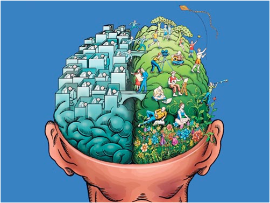Constructivism
Constructivism, includes elements of both humanism and cognitivism. The tie between constructivism and humanism appears stronger, however, than the tie between constructivism and cognitivism. Constructivism is grounded in the humanistic tradition of personal meaning but does not embrace all cognitive perspectives Williams, R (1999).
Constructivists believe that we create our own meaning. Thus, learning is defined as the construction of meaning. Both knowledge and moral values are constructed by children as they interact with their physical and social environment
Kamii (1980).
Learners construct rather than absorb knowledge i.e. learning is an active process and participation is critical. Knowledge varies with cultural and individual experiences.
Educational Implications:
Classroom activities
This page contains suggested classroom management skills and activities utilising the Constructivist perspective.
Further Information
The E-Learning Curve Podcast: Introduction to Constructivism - view here
Rebuttal and reading from Stephen Downes - view here
Constructivism - view here
Primary School Social Studies Class - view here

Image from wired.com